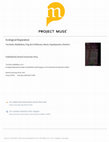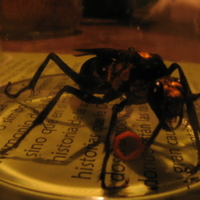Papers by Marisol de la Cadena
If we keep on speaking the same language together, we're going to reproduce the same history. Beg... more If we keep on speaking the same language together, we're going to reproduce the same history. Begin the same old stories all over again. Don't you think so? [.. .] The same difficulties, the same impossibility of making connections. The same. .. Always the same.-Luce Irigaray, This Sex Which Is Not One We know, knowledge there is, but the idiot demands that we slow down, that we don't consider ourselves authorized to believe we possess the meaning of what we know.

Tapuya: Latin American Science, Technology and Society, 2021
This Thematic Cluster is about ends. Ends of lives and relations, of possibilities and beginnings... more This Thematic Cluster is about ends. Ends of lives and relations, of possibilities and beginnings. If we use “ends” in the plural it is not only to signal to the multiplicity of places, bodies, and technopolitical arrangements in and with which ends unfold – but also to find a way of accounting for ends that end differently and that establish divergent continuities, if any. Ends in the plural because sometimes ends continue and continuation annihilates. For the disaster “we” – the “we” of those that think in terms of an actual “we” – have managed to create is not the fact of extinction nor the coming of an end, but the proliferation of extinctions that do not cease to kill – or that kill without ending – and ends that do not allow for openings and regenerations. In this Thematic Cluster, we try to think with the processes, sites, beings, and ecologies that, in the specificity of their divergent endings, render ends problematic: they force us to think ends in other terms.

Ecological Reparation: Repair, Remediation and Resurgence in Social and Environmental Conflict. , 2023
With the 2019 Chilean ‘estallido social’ we write-think-feel the myriad images that, actors of ... more With the 2019 Chilean ‘estallido social’ we write-think-feel the myriad images that, actors of the outburst, covered walls of Santiago streets. We read those images as an archive written from the wounds that colonialism-capitalism inflicted on bodies and territories that are together. Albeit ephemeral (authorities can delete them) the images expose mutilations of bodies-territories that are never to be erased, always to be cared for. Composed of presences both, unimaginable (the dead, walls, dogs) and imaginable (music, people, images), the outbursts are those wounds. Their presence haunts usual politics: without teleology or leadership—let alone representation—outbursts do not disappear for their mission is to pursue life against destruction. Pursuing life they roam the streets like mutts, and very specifically like the Chilean kiltro dogs—their decision to negotiate independence and accompaniment as way of life may be an inspiration of an alternative politics: a ‘kiltro’ politics.
If we keep on speaking the same language together, we're going to reproduce the same history. Beg... more If we keep on speaking the same language together, we're going to reproduce the same history. Begin the same old stories all over again. Don't you think so? [.. .] The same difficulties, the same impossibility of making connections. The same. .. Always the same.-Luce Irigaray, This Sex Which Is Not One We know, knowledge there is, but the idiot demands that we slow down, that we don't consider ourselves authorized to believe we possess the meaning of what we know.

Maloca: Revista de Estudos Indígenas
Na América Latina, a política praticada pelos povos indígenas tem sido classificada como “polític... more Na América Latina, a política praticada pelos povos indígenas tem sido classificada como “política étnica”. Seu ativismo é interpretado como uma questão de fazer prevalecer direitos culturais. Mas e se “cultura” for uma noção insuficiente, e até mesmo inadequada, para pensar o desafio que a política indígena representa? Inspirado nos eventos políticos recentes no Peru — e, em menor medida, no Equador e na Bolívia — em que o movimento indígena-popular tem evocado entidades sencientes (montanhas, água e terra — aquilo que chamamos de “natureza”) para o interior da esfera da política pública, o argumento deste ensaio possui três dimensões. Primeiro, a indigeneidade, como uma formação histórica, excede a noção usual de política, isto é, uma arena povoada de seres humanos racionais disputando o poder de representar outros humanos frente ao Estado. Segundo, a atual emergência política da indigeneidade — nos movimentos de oposição antimineração no Peru e no Equador, mas também em eventos c...
Dans cet article, le terme « incommun » est pre´sente´ comme une re´ponse conceptuelle a` des que... more Dans cet article, le terme « incommun » est pre´sente´ comme une re´ponse conceptuelle a` des questions souleve´es dans un contexte de conflits entourant l’e´chelle et l’e´tendue de plusieurs « communs » menace´s par l’extractivisme. Il pre´sente les articles de ce nume´ro spe´cial, soumis en re´ponse a` l’invitation a` re´fle´chir sur le concept des « incommuns » dans des situations varie´es. Il conclut que ces articles constituent un fort ancrage sugge´rant que les incommuns sont constitutifs des communs et que le « faire incommun » pourrait eˆtre crucial dans la constitution de communs solides.
The Sociological Review Monographs, 2020
Present-day academic work is mostly done in English. What happens, or so the contributions to thi... more Present-day academic work is mostly done in English. What happens, or so the contributions to this monograph ask, when we open a few windows, let in some air, and invite elements drawn from other linguistic traditions into our texts? Doing so does not simply mean welcoming other words. Along with this it also changes the conditions, the terms, that stipulate what is, and what is not, good-proper, interesting, international, academic-writing.

The Sociological Review Monographs, 2020
This article is about cows in Colombia, the practices that make them different. Although our main... more This article is about cows in Colombia, the practices that make them different. Although our main concern is not the difference among breeds, we pay crucial attention to the word breed which, in its exclusive animal-use, does not exist in Spanish. Its translation becomes raza, a word that is also used to classify humans and therefore easily translates into English as 'race'. Maintaining these differences in analytical sight, we follow the practices that make res and ejemplar-two types of bovines. Untranslatable to English, res refers to an ordinary cow or bull; the second one indicates an exemplary bovine, even a prized one. The practices that make these animals are different. We explain how making res does not meet the requirements of breed, while making ejemplar does; consequently, while the latter has breed, a res has a slippery raza, one that, difficult to pin down, transgresses the firmness of breeds. Thus, raza can be different from breed, and surprisingly, it is also different from 'race' in English: the slippery quality of raza also surfaces when talking about people, at least in Colombia and Peru, the countries of origin of the authors of this article. If classified, their raza may shift from 'white' to 'mestizo' (not white) depending on the eyes of the beholder-like res!
The following is a response to the comments on de la Cadena, Marisol. 2015. Earth beings: Ecologi... more The following is a response to the comments on de la Cadena, Marisol. 2015. Earth beings: Ecologies of practice across Andean worlds. Durham, NC: Duke University Press, which was published in Hau: Journal of Ethnographic Theory 7(1): 537-565.
HAU: Journal of Ethnographic Theory, 2014
Comment on kohn, Eduardo. 2013. How forests think: Toward an anthropology beyond the human. Berke... more Comment on kohn, Eduardo. 2013. How forests think: Toward an anthropology beyond the human. Berkeley: university of California press. It is impossible to take from them this superstition because the destruction of these guacas would require more force than that of all the people of Peru in order to move these stones and hills. -Cristóbal de Albornoz, 1584 1 How forests think is a great book that pushes thought carefully. The interface that motivates it-multispecies, semiosis, history, ethnography-is capaciously inviting. personally, both the location of this book in the great Amazon (a close thinking home to me) and Eduardo's hope for alter-politics feel like the right place to take ethnographic-conceptual risks. I hope my comments below do so.

Latin American Research Review, 2000
In recent decades, the impacts of climate on society and on human well-being have attracted incre... more In recent decades, the impacts of climate on society and on human well-being have attracted increasing amounts of attention, and the forecasts that predict such impacts have become more accurate. Forecasts are now distributed and used more widely than they were in the past. This article reviews three cases of such use of forecasts in Latin America. It shows that in all cases, the users are concentrated in particular sectors and regions (agriculture in the Argentine pampas, sheries on the Peruvian coast, water resources in northeastern Brazil) and that the forecasts are distributed not by government agencies but by intermediate organizations-semistatal organizations or nongovernmental organizations. It draws on the concept of environmental citizenship to discuss these cases and assesses them for such attributes of citizenship as equity, transparency, accountability, and promotion of collective goals. It traces the implications of these cases for the current era of global warming.
Hau: Journal of Ethnographic Theory (2015) 5(1): 437-475
Contribution to the Hau forum "Anthropology and STS: Generative interfaces, multiple locations." ... more Contribution to the Hau forum "Anthropology and STS: Generative interfaces, multiple locations." (Marisol de la Cadena, Marianne E. Lien, Mario Blaser, Casper Bruun Jensen, Tess Lea, Atsuro Morita, Heather Anne Swanson, Gro B. Ween, Paige West, Margaret J. Wiener).
HAU: Journal of Ethnographic Theory, 2015
Contribution to the Hau forum "Anthropology and STS: Generative interfaces, multiple loc... more Contribution to the Hau forum "Anthropology and STS: Generative interfaces, multiple locations." (Marisol de la Cadena, Marianne E. Lien, Mario Blaser, Casper Bruun Jensen, Tess Lea, Atsuro Morita, Heather Anne Swanson, Gro B. Ween, Paige West, Margaret J. Wiener).
Talks by Marisol de la Cadena
Call for papers for a Special Issue to be Published in Tapuya: Latin American Science, Technology... more Call for papers for a Special Issue to be Published in Tapuya: Latin American Science, Technology and
Society











Uploads
Papers by Marisol de la Cadena
Talks by Marisol de la Cadena
Society
Society